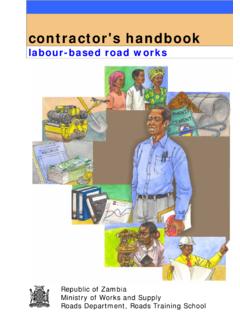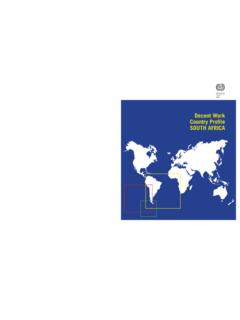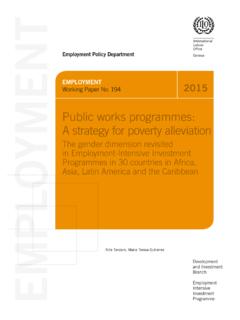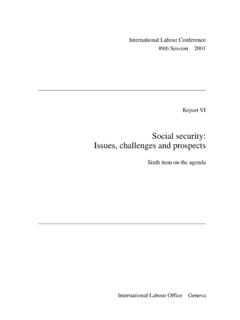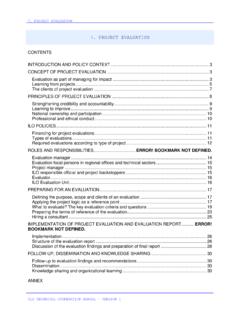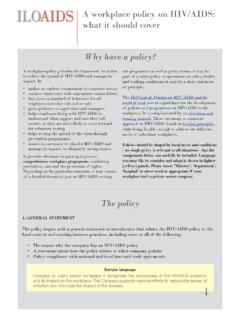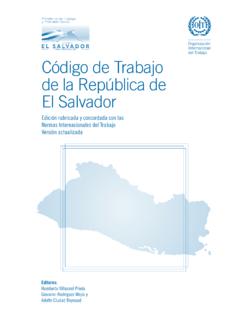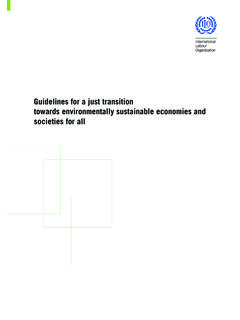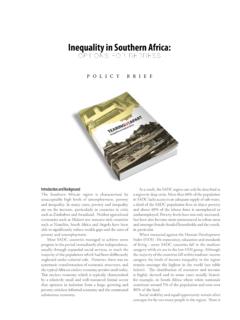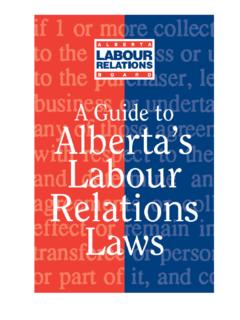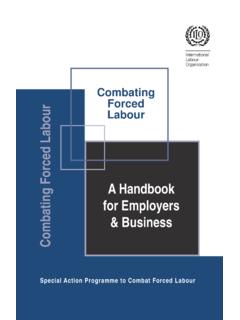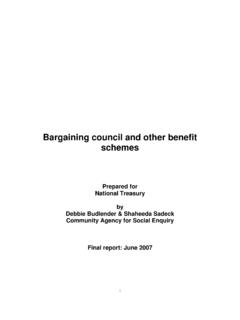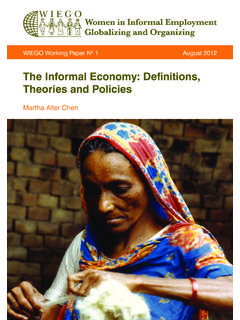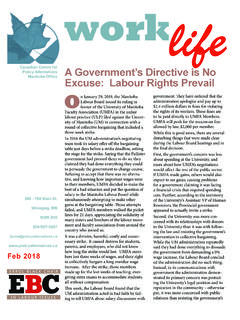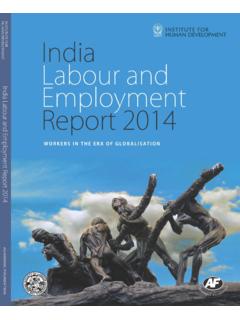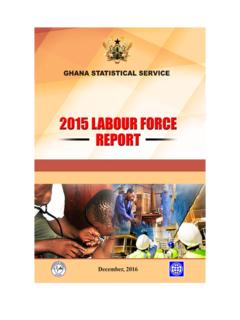Transcription of The International Labour Organization
1 The International Labour Organization The International Labour Organization was founded in 1919 to promote social justice and, thereby, to contribute to universal and lasting peace. Its tripartite structure is unique among agencies affiliated to the United Nations, the ILO's Governing Body includes representatives of government and of employers' and workers' organizations. These three constituencies are active participants in regional and other meetings sponsored by the ILO, as well as in the International Labour Conference a world forum which meets annually to discuss social and Labour questions. Over the years, the ILO has issued for adoption by member States a widely respected code of International Labour Conventions and Recommendations on freedom of association, employment, social policy, conditions of work, social security, industrial relations and Labour administration, among others. The ILO provides expert advice and technical assistance to member States through a network of offices and multidisciplinary teams in over 40 countries.
2 This assistance takes the form of Labour rights and industrial relations counselling, employment promotion, training in small business development, project management, advice on social security, workplace safety and working conditions, the compiling and dissemination of Labour statistics, and workers' education. ILO Publications The International Labour Office is the Organization 's secretariat, research body and publishing house. The Publications Bureau produces and distributes material on major social and economic trends. It publishes policy statements on issues affecting Labour around the world, reference works, technical guides, research-based books and monographs, codes of practice on safety and health prepared by experts, and training and workers' education manuals. It also produces the International Labour Review in English, French and Spanish, which publishes the results of original research, perspectives on emerging issues, and book reviews.
3 Catalogues and lists of new publications are available free of charge from ILO Publications, International Labour Office, CH-1211 Geneva 22, Switzerland. Protection of workers' personal data An ILO code of practice Protection of workers' personal data International Labour Office Geneva Copyright International Labour Organization 1997. First published 1997. Publications of the International Labour Office enjoy copyright under Protocol 2 of the Universal Copyright Convention. Nevertheless, short excerpts from them may be reproduced without authorization, on condition that the source is indicated. For rights of reproduction or translation, application should be made to the Publications Bureau (Rights and Permissions), International Labour Office, CH-1211 Geneva 22, Switzerland. The International Labour Office welcomes such applications. Libraries, institutions and other users registered in the United Kingdom with the Copyright Licensing Agency, 90 Tottenham Court Road, London W1P 9HE (Fax: +44 171 436 3986), in the United States with the Copyright Clearance Center, 222 Rosewood Drive, Danvers, MA 01923 (Fax: +1 508 750 4470), or in other countries with associated Reproduction Rights Organizations, may make photocopies in accordance with the licences issued to them for this purpose.
4 ILO. Protection of workers' personal data. An ILO code of practice Geneva, International Labour Office, 1997. /Code of practice/, /text/, /privacy/, /confidentiality/, /data protection/, /workers' rights/. ISBN 92-2-110329-3. Also published in French: Protection des donn es personnelles des travailleurs. Recueil de directives pratiques du BIT (ISBN 92-2-210329-7), Geneva, 1997. In Spanish: Protecci n de los datos personales de los trabajadores. Repertorio de recomendaciones pr cticas de la OIT (ISBN 92-2-310329-0), Geneva, 1997. ILO Cataloguing in Publication Data The designations employed in ILO publications, which are in conformity with United Nations practice, and the presentation of material therein do not imply the expression of any opinion whatsoever on the part of the International Labour Office concerning the legal status of any country, area or territory or of its authorities, or concerning the delimitation of its frontiers. The responsibility for opinions expressed in signed articles, studies and other contributions rests solely with their authors, and publication does not constitute an endorsement by the International Labour Office of the opinions expressed in them.
5 Reference to names of firms and commercial products and processes does not imply their endorsement by the International Labour Office, and any failure to mention a particular firm, commercial product or process is not a sign of disapproval. ILO publications can be obtained through major booksellers or ILO local offices in many countries, or direct from ILO Publications, International Labour Office, CH-1211 Geneva 22, Switzerland. Catalogues or lists of new publications are available free of charge from the above address. Printed in Switzerland ART. Preface Employers collect personal data on job applicants and workers for a number of purposes: to comply with law; to assist in selection for employment, training and promotion; to ensure personal safety, personal security, quality control, customer service and the protection of property. New ways of collecting and processing data entail some new risks for workers. While various national laws and International standards have established binding procedures for the processing of personal data, there is a need to develop data protection provisions which specifically address the use of workers'.
6 Personal data. The purpose of this code of practice is to provide guidance on the protection of workers' personal data. As an ILO code of practice, it has no binding force, but rather makes recommendations. The code does not replace national laws, regulations, International Labour standards or other accepted standards. It can be used in the development of legislation, regulations, collective agreements, work rules, policies and practical measures at enterprise level. This code of practice was adopted by a Meeting of Experts on Workers' Privacy of the ILO. The meeting was convened in Geneva from 1 to 7 October 1996 in accordance with the decision taken by the Governing Body of the ILO at its 264th Session (November 1995).1 The meeting was composed of 24 experts, eight of whom where appointed following consultations with government, and eight each following consultations with the Employers' and Workers' Groups of the Governing 1. The meeting examined a draft code of practice on the protection of workers' personal data (document MEWP/1995/1).
7 The agenda of the meeting also included recommendations for future ILO. action, including consideration of the possibility of adopting International Labour standards in this field. The report of the meeting (document MEWP/1996/5) contains the summary of discussion, the text of the code of practice adopted by the meeting and recommendations made by the experts for future ILO action on the subject. 2. Experts appointed following consultations with governments: Mr. A. Bhattacharya, Director, Ministry of Labour , Government of India, New Delhi (India);. Professor M. H. Cheadle, Adviser, Ministry of Labour , Johannesburg (South Africa);. Ms. S. J. De Vries, Ministry of Social Affairs and Employment, The Hague (Netherlands);. Mr. G. Dutra Gimenez, National Director of Employment, Ministerio de Trabajo, Montevideo (Uruguay);. Ms. K. Leigh, Senior Government Counsel, International Civil and Privacy Branch, Civil Law Division, Attorney-General's Department, Barton (Australia).
8 Ms. A. Neill, Senior Counsel/Director, Department of Justice Canada, Ottawa (Canada);. Mr. O. Vidnes, Deputy Director-General, Royal Ministry of Local Government and Labour , Oslo (Norway);. Mr. H. P. Viethen, Head, Section for Employment Relationships Law, Federal Ministry of Labour and Social Affairs, Bonn (Germany). Experts appointed following consultations with the Employers' group: Mr. J. Fuller, Senior Labour Counsel, US Council for International Business, Illinois (United States);. Ms. A. Knowles, Deputy Chief Executive, New Zealand Employers' Federation Inc., Wellington (New Zealand);. Ms. A. Mackie, Consultant, Confederation of British Industry, London (United Kingdom);. Mr. G. Muir, Manager, Industrial Relations, do Australian Chamber of Commerce and Industry, Melbourne (Australia);. Mr. S. K. Nanda, Secretary-General, Employers' Federation of India, Bombay (India);. Mr. J. M. Szambelanczyk, Expert, Confederation of Polish Employers, Poznan (Poland).
9 V. Protection of workers' personal data The meeting recommended that the code of practice be widely distributed. The experts also suggested that the commentary to the code that was prepared by the International Labour Office accompany the code, as it contains explanations that the experts felt would be helpful in interpreting and applying the code, and draws attention to relevant International Labour standards. The Governing Body approved the distribution of the code of practice and the commentary, which was revised in the light of the discussion of the meeting, at its 267th Session (November 1996). Mr. A. Van Niekerk, Adviser, Business South Africa, do Anglo American Corporation of South Africa Ltd., Johannesburg (South Africa);. Mr. H. K. Werner, Attorney-at-Law, Danish Employers' Confederation, Copenhagen (Denmark). Experts appointed following consultations with the Workers' group: Mr. H. Bouchet (titular), Secretary General, Conf d ration Force Ouvri re, Paris (France).
10 Mrs. V. Lopez Rivoire (substitute), Conf d ration Force Ouvri re, Paris (France);. Ms. L. Cronin, Legal Adviser, New Zealand Nurses' Organization , Wellington (New Zealand);. Mr. R. Delarue, Legal Adviser, Conf d ration des Syndicats chr tiens de Belgique, Brussels (Belgium);. Mr. T. Fred n, Ombudsman, Department for Wage and Working Life Policy, Swedish Trade Union Confederation (LO), Stockholm (Sweden);. Mr. E. R. Hoogers, National Union Representative, Canadian Union of Postal Workers, Ottawa (Canada);. Mrs. B. Kailou, SYNATREN-USTN, Niamey (Niger);. Mr. M. Tshehla, Participatory Research Unit Coordinator, Congress of South African Trade Unions (COSATU), Johannesburg (South Africa);. Mr. J. H. Valero Rodriguez, Central Unitaria de Trabajadores de Colombia, Bogota (Colombia). Observers: European Commission;. European Union Data Protection Commissioners;. General Confederation of Trade Unions;. International Confederation of Free Trade Unions;. International Organization of Employers.
